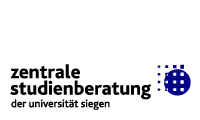Zentrale Studienberatung
im F-S Gebäude
Sandstraße 16-18
57072 Siegen
Erreichbarkeit der
studentischen Hotline:
0271 740-2712
Mo - Do: 9 - 16 Uhr
Fr: 9 - 12 Uhr
Mail:
info.studienberatung[at]
zsb.uni-siegen.de
Terminvereinbarung für eine Beratung über:
0271 740-2712
International Students
You find information about the admission procedure here:
STARTING
Impressum
Social Sciences in Europe

Short Information
| Restricted
admission |
Regular
study time |
Winter
semester |
Summer
semester |
|---|---|---|---|
| yes | 2 semester | ✔ | ✔ |
Admission procedure
Application required
You can apply here
Degree
Master of Arts
More information
Language of instruction
German and English
Deadlines
The degree program
The one-year Master’s degree program offers Bachelor’s
graduates with extensive prior knowledge in the field of social
science-oriented European studies the opportunity for further
qualification, which is geared towards independent and advanced
analyses of social issues and problem situations.
The M.A. Social Sciences in Europe provides research-oriented,
theory-driven, and interdisciplinary knowledge based on the
current state of international research in the social sciences.
The focus is on conveying factual and methodological elements
and principles in order to be able to develop independent
social science analyses and suitable solutions. The degree
program focuses on the diversity of social and political
realities and the complex, often transnational transformation
processes of the present.
Special attention is paid in this research-oriented study model to the close connection between research and teaching. The focus of the one-year program is the development and implementation of the student’s own final project. The Master’s thesis should be located in the thematic field of Europe, transnationalization or globalization or take an international comparative perspective.
The research-oriented degree program provides students with the necessary knowledge, skills and methods to work in an academic field with a sense of responsibility. Possible employers and fields of activity for graduates include internationally operating companies, international governmental and non-governmental organizations (e.g. institutions of the European Union), agencies and media of international and intercultural communication, advisory boards and general secretariats of foundations and other private-law organizations, private-sector research and consulting agencies, political parties, associations and national non-governmental organizations, public administration with the special tasks of analysing and planning social and cultural structures of public services as well as the field of education and further education in science and research.
Admission requirements and application
- Admission to the Master’s degree program “Social Sciences in Europe” is granted to students who have completed a four-year Bachelor’s program in Social Sciences or a comparable program with a grade of at least “good” (2.5).
- Furthermore, students must provide vidence of knowledge in the field of European Studies, globalization or transnationalization amounting to at least 36 LP.
- The Bachelor’s program should have included 60 LP of study abroad. Applicants with a degree in comparable, but only three-year Bachelor’s degree programs must also provide proof of successfully completed studies abroad of at least one year as well as relevant subject matter.
Program models
The one-year study model is designed to be research-oriented. It can only be studied full-time. For successful completion, 60 credit points must be earned in the consecutive Master’s degree program in Social Sciences in Europe. Of these, 30 credit points are allocated to subject-specific modules and 30 credit points to the Master’s examination.
Stays abroad
There are no study abroad programs in this Master's degree program.
Perspectives
The research-oriented degree program provides students with the necessary knowledge, skills, and methods to work responsibly in an academic field of activity. Possible employers and fields of activity for graduates are, for example, internationally operating companies, international governmental and non-governmental organizations (e.g. institutions of the European Union), agencies and media of international and intercultural communication, advisory boards and general secretariats of foundations as well as other organizations under private law, private-sector research and consulting agencies, political parties, associations and national non-governmental organizations, public administration with the special tasks of analyzing and planning social and cultural structures of public services as well as the field of education and further education in science and research.
Study organization
Subject examination regulations including study
plans and module descriptions
The Framework Examination Regulations (RPO-M) and the general
subject-specific regulations of the subject examination
regulations (PHIL-FPO-M) define the general regulations of
studying in Siegen and at the Faculty of Arts and Humanities.
In addition, the subject examination regulations of the
individual (partial) degree programs (FPOs) define the basic
structures of a (partial) degree program (e.g. admission
requirements and content to be studied). The examination
regulations are accompanied by curricula, which represent the
recommended exemplary course of study in the individual
subjects, as well as module descriptions (content-related
information on modules).
Students are automatically subject to the current version of an
FPO when they enroll for their first semester.


